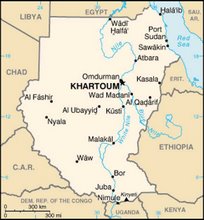The Government of Sudan makes it virtually impossible for foreigners to stay in Sudan and to travel within the country. My last ten days have been dominated by paperwork, permissions, and visits to various organizations and government Ministries in order to renew my permit to stay here and receive clearance to travel to Juba to run another training. Unbeknownst to me, visitors must renew their permits on a monthly basis, even with a three month visa. After securing a renewal letter from Ahfad (on university letterhead with an official stamp), Abdul Asim’s friend took my passport, photos, and forms to the Ministry to renew my permit. Four days later, two days of which someone waited at the Ministry all day on my behalf, I received my passport back with my permit. And this is not even the half of all the running around, gathering of letters, and scheduling and rescheduling that took place for me to get to Juba. I was about ready to pull my hair out in frustration the whole process was so irritating.
But alas, I am here in Juba now, sitting right along the Nile and watching the sun set. I feel so much more at home here in the capital of the Government of Southern Sudan (GOSS), perhaps because most of the people speak English, or most are Christian, or maybe it’s that the lush green landscape and people remind me very much of Kenya and of the Africa that is familiar to me. Regardless, I can already tell that I am going to feel much more comfortable here than I do in the north.
Decades of war destroyed the infrastructure of southern Sudan. Communication here is incredibly difficult – most people have two cell phones: one on the Ugandan network and the other on a Sudanese network. When attempting to make a call, you often must try five or six times before your phone actually connects to a network. The phone Sharaf lent me, which is on a Sudanese network, only works about 25% of the time. Electricity is at a minimum and everything runs off generators. Transport requires a 4-wheel drive vehicle and skilled driver, as the roads are a sea of deep potholes and ditches. There is no public transport, at least that I’ve been able to identify.
Most aid agencies have their staff live and work out of their office (UNDP, UNMIS, UNICEF, etc.). Other organizations rent tents and containers in one of a handful of camps set up for visitors. These camps are making quite a profit off of the humanitarian and international organizations. A tent is $160/night, and a container is $220/night. With vehicle rental costing about $150/day, organizations are easily spending $325/day to have their staff stay in Juba. The prices for everything here are exorbitant.
I spent most of my day today with Beatrice, the Coordinator for SuWEP South, running from office to office recruiting women to come to the workshop tomorrow. With the phones being so bad, the best way to meet with people or schedule appointments is to go directly to their office. We met with several of the women who are Members of Parliament in the GOSS, and several who are working in various Ministries or government funded peace and relief organizations. Since the legislature is still in session, many of these women will not be able to attend the training, so who knows how many women will actually show up tomorrow morning for the training. At the end of the day, we walked into Vice President Riek Machar’s office and scheduled an appointment for Thursday afternoon. A friend from Khartoum wrote a letter on my behalf asking for a meeting with the VP. I’m looking forward to meeting the man who split the SPLA and asking for his thoughts about the current and future political situation of Southern Sudan. It is quite amazing how easily one can meet with officials in the government down here.
But for now, it’s great to be relaxing by the mother of all rivers after a very long day of travel and running around (flights from Khartoum to Juba leave at 7:00 AM so I was at the airport by 5:00). I can tell I’m really going to enjoy being here.
Subscribe to:
Post Comments (Atom)

No comments:
Post a Comment